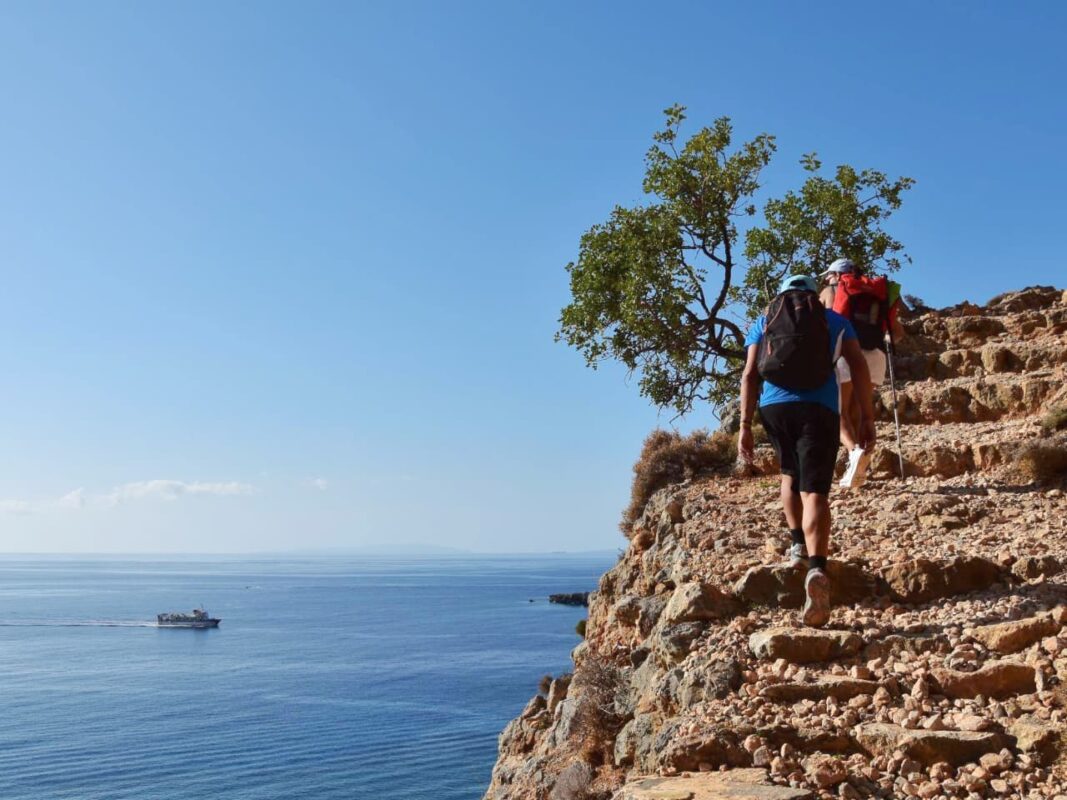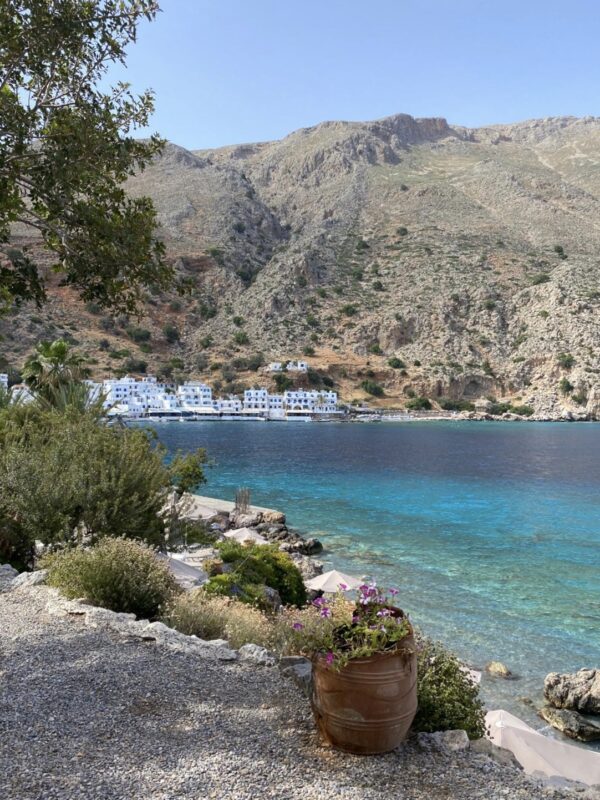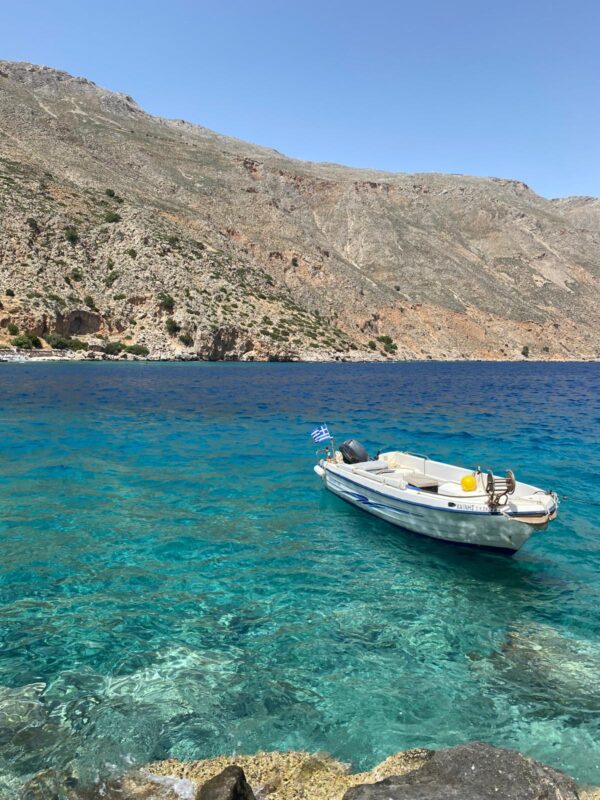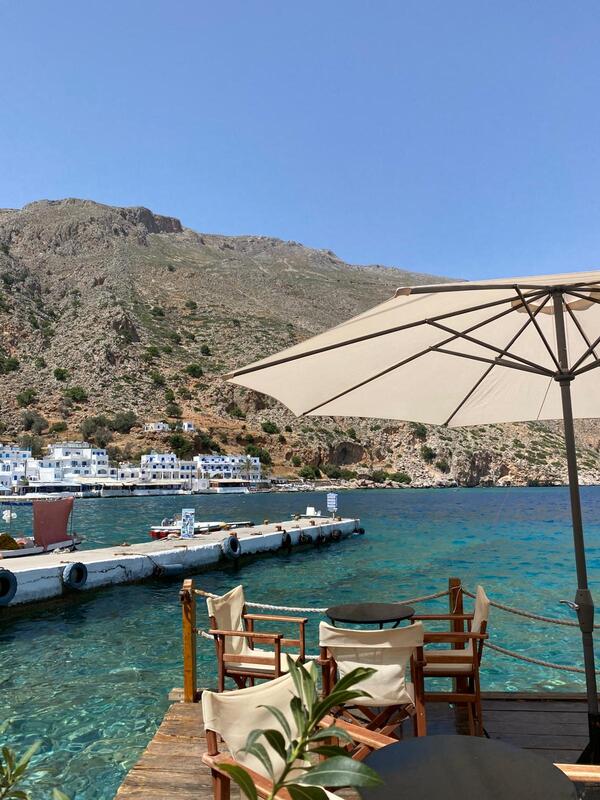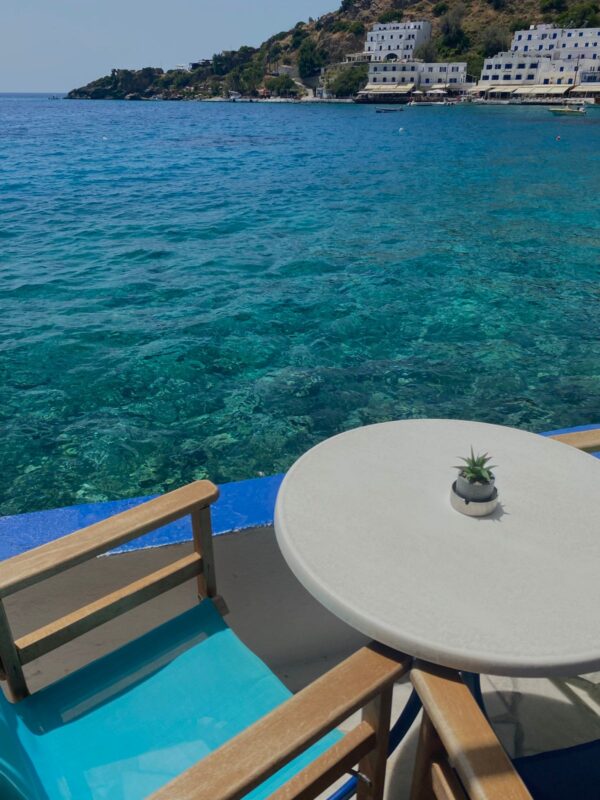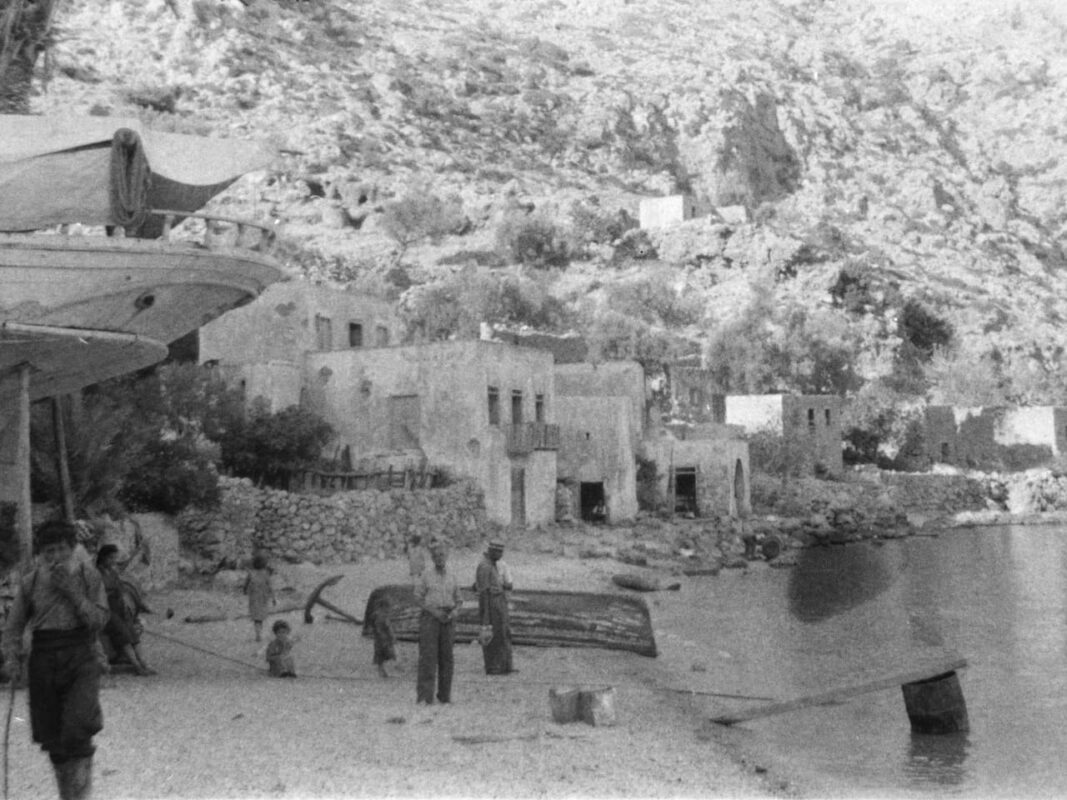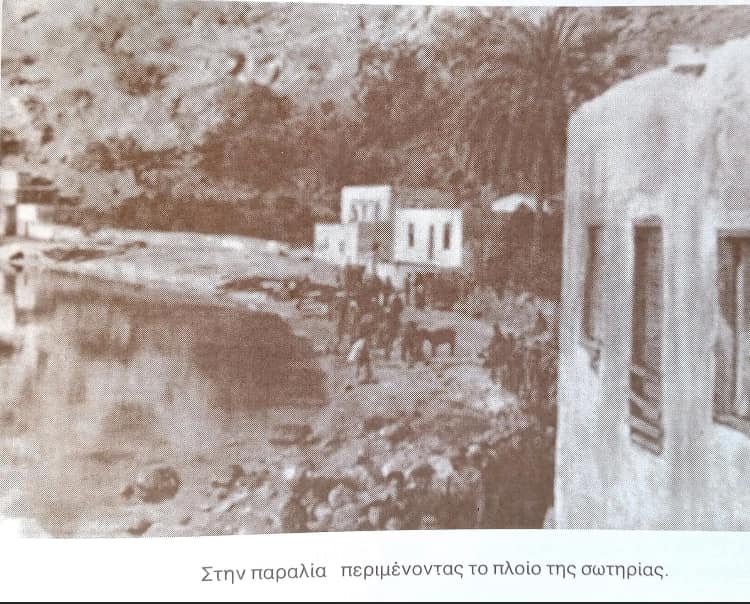Sight
The sea remembers Loutro of Sfakia
Cover photo by CreteTravel
The sea remembers…
Join us as we share mythical beaches and old forgotten (perhaps also a bit imaginary) tales from Crete with you.
Loutro of Sfakia, early May, sometime between 10 a.m. and a memory.
I had just arrived, hiking the rocky path E4 from Sfakia to Loutro, tired but happy. I stopped to drink a fresh orange juice at a little café right on the seafront. Tables made of iron, painted light blue, with tiny rust spots, carrying the salt of the years. In the pots around me, the smell of geranium and basil mingled with the sea saltiness.
The taste of the orange was refreshing after the dust of the road, sweet and a little sour. Beside me, two old men were drinking Greek coffee and talking about the old days: “This was once a village you wouldn’t even find on a map.” A little further away, a guide was pointing something out to a couple of tourists. I only caught fragments of his words: “…from ancient Phoenix, they would set sail for Africa. The whole southern sea was theirs…”
The endless blue before me overwhelmed my eyes, dotted with small boats drifting soundlessly. And although it was still fairly early, I felt the only thing I wanted was to stand there among the pebbles, to lie down and become one with the place. I drank the orange juice in one go and went down to the beach.
Loutro bay views from Castella Loutro, and other spots, all taken by Léa, intern at FISIKA.
I didn’t notice when sleep came over me. I only remember the sound of the sea, not the waves, but the other sound, the whisper, the one it makes when it gently embraces a pebble and retreats again. That whisper became a voice, and the voice became a dream.
The place transformed and I was a fisherman, with hardened hands and skin burned by the sun. The shore was full of wooden ships with sails glittering in the sun. The Dorians were loading iron weapons, wine, and olive oil. The air smelled of smoke from sweet incense. I saw the path from the shore up the slope, with priestesses dressed in white climbing silently toward the temple. Two warriors walking behind me were discussing about the Phoenix city and their voyage to Cyrene. I didn’t understand all their words, but I felt their steps carried something heavy, like a secret.
Suddenly, the bells rang. The harbour had changed again. Now I was in the Venetian era. I saw the fortress with its towers guarding the entrance, and workers. I was one of them, hauling stones to raise the walls. The captains of the galleys shouted commands. The harbour was a crossroads of Mediterranean powers, with ships from Venice, the Barbary Coast, and Naples.
Spices from the East, wine sloshing from barrels, and sacks of grain filled the harbor with the scent of commerce. But beyond the noise and movement, the sea held my attention. It didn’t belong to any empire. It watched, it waited, it remained free.
A shadow covered the sun. I could now see low ships on the water, gliding fast like wolves’ shadows on the sea. The Saracen pirates were coming.
I was an old villager running to hide. The women fled to the caves, while the men clutched small knives, hoping to prevail. But stronger than fear was awe, that frozen sense that an unstoppable force was approaching, like a storm that would sweep everything away. The pirates’ voices, as they neared the shore, meant fire and plunder. They found every passage through the shallows and every hiding place along the coast.
I felt this land was bare, yet it carried the strength to endure, like a rock standing firm in the wind.
The sea clouded and turned to smoke. Before me rose the Koulés of Loutro, the great fortress of the Ottomans. Its walls gleamed threateningly in the light.
This time, I was a young boy. My grandmother gave me a Sfakian pie with a bit of honey to give me strength. “Eat, my child, for courage,” she said. Then I ran to the mountain. On the path, my comrades waited. We clasped hands in silence. In our eyes burned the same resolve: not to let our land be lost.
I heard the Ottoman guards at the fortress laughing loudly, but I knew that soon their laughter would fill with fear. For in Sfakia, no one was ever truly subdued.
Then, the drone of airplanes filled the sky. The land no longer smelled of brine and thyme, but of smoke. It was the war with the Germans.
In Loutro, fighters, and families sought secret refuge. Some hid in storerooms, others waited by night for the boat that would take them to Egypt.
I was a young child, curled up beside my mother behind some rocks. She held me tight and whispered not to make a sound. In my pocket, I had a small seashell, a talisman, to remind me that the sea was a friend, not an enemy.
The moon lit the water dangerously. We all feared its light would betray us. The men carried sacks and weapons, speaking hastily with some allies. At the edge of the harbour, an empty boat was waiting.
I shut my eyes tight and tried to listen just to the waves. The sound was sharp, restless, like a breath cut short. I thought: if we manage to leave, Loutro will remain behind; if not, Loutro will keep us with it forever.
And there, in the heart of anxiety, I understood that the sea is a witness, and a silent companion in every trial.
Loutro 1942 by Lidio Cipriani, and 1941 during the evacuation.
I then heard a voice. Maybe it was the wind. Maybe the wave. Then nothing.
I woke with a drop of sweat on my back and a bee buzzing near my ear. I opened my eyes and saw the Libyan Sea as it truly is: calm, deep, full of stories still whispered among the stones of Loutro. The beach was exactly as I had left it, with sunburned bathers speaking English or French, unaware that I had just lived in a story through time. All thanks to the sea as the sea remembers…
Today, as I sit by the sea, I’m reminded that this same water touches Gaza. It’s the same sea that has witnessed centuries of conflict, resistance, and survival, from ancient Crete to today’s humanitarian crisis.
This story you just read began as a reflection on Crete’s past, but it actually ends with a call to recognize what’s happening now to the people of Palaistine.
The Global Sumud Flotilla, with 50+ civilian vessels carrying aid to Gaza, was a peaceful mission that has been blocked entirely today by Israeli forces. Watching the tracker of those ships, (also Madleen’s in July), pass by Crete on their way to Gaza, I felt the weight of history return. The same sea that carried resistance fighters and allies just 80 years ago, now carried activists with baby formula.
We’ve always said we stand with unarmed civilians, no matter their nationality. But maybe that’s not enough anymore.
If you’ve ever felt peace in Loutro, or anywhere along these shores, I hope you’ll let that feeling guide you, to speak up, to care, to act.
Because the sea connects us all. And it never forgets.
The inspiration for this story was born from two things:
- The place itself, Loutro of Sfakia, with its long history, and
- the journey of the sailing ship Madleen, which passed before Loutro in June 2025, and the Global Sumud Flotilla during September and October 2025, where more than 50 boats had set sail from ports around the world, large and small, converging toward Gaza in the largest coordinated civilian flotilla in history.
Every day, I watched Madleen’s route and Global Sumud Flotilla ships on the tracking map, anxious about whether they would ever reach their destination. The ships carried basic goods (food and medical supplies) as a symbolic amount of humanitarian aid to Gaza, trying to break the blockade and offer relief to civilians. This was never just a mission; it is an act of solidarity.
Watching them sail the same sea that for centuries had “seen” sieges, conquests, resistance, and hunger, I felt all the stories of my birthplace return. From the Dorians and Venetians to the Saracens, Ottomans, and the war of the ’40s. Crete, and Greece as a whole, has endured the weight of foreign rule and violence, but also hunger, anxiety, and the struggle for freedom in its very bones. The same feeling hits as we witness the genocide in Gaza in the past 75 years.
Urge governments and foreign offices to demand the release of their citizens who were on board the Global Sumud Flotilla to Gaza and to call for an end to the siege and genocide.
Select here the countries whose governments you wish to contact. These nations have citizens participating in the flotilla.
The Koulés/ castle of Loutro:
A Turkish fortress, probably rebuilt in 1868, above the harbor of Loutro. It was likely the central stronghold of the area, rectangular with two towers and a cistern. After liberation it served as a school (Allover Greece, unescositesincrete.gr).
Its position, on the hill near the church of Agia Aikaterini, functioned both as fortress and early warning point (“Small Koulés”) (Cretan Beaches, kastra.eu).
Ancient Phoenix / Phoenix / Anopolis:
Loutro is considered part of the ancient city of Phoenix, the port of Anopolis, an important harbor in the Hellenistic and Roman periods. Today, nothing remains of the ancient settlement except the name and location (Wikipedia).
Venetian & Saracen Era:
During Venetian rule, Loutro was an important trade hub fortified against pirate raids (triptocrete.com).
Earlier, it had been used by Saracen pirates as a refuge, taking advantage of the harbor’s hiding places (Wikipedia).
World War II & Resistance:
Loutro and the wider Sfakia region were key bases for aiding Allied resistance, supplying the bravery of many – Greeks, Cretans, Brits, New Zealander’s & Australian fighters. (triptocrete.com, Facebook group).
From Sfakia, a wide evacuation and assistance to Allies also took place after the Battle of Crete (NZHistory).

